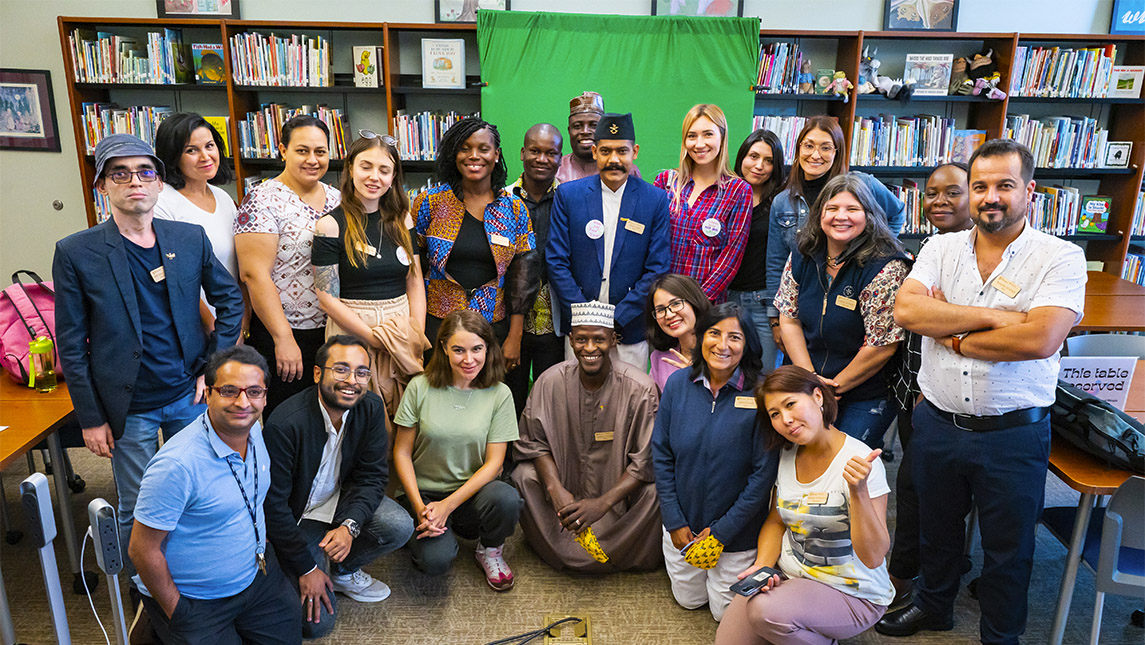UNCG hosts 21 international teachers through Fulbright TEA Program
This fall, UNCG hosted 21 global scholars in the Fulbright Teaching Excellence and Achievement (Fulbright TEA) Program, a U.S. government program supported by the Bureau of Educational and Cultural Affairs (ECA) of the United States Department of State, and administered by the International Research and Exchanges Board (IREX). One of seven U.S. universities selected to host the six-week program, it was made possible through a competitive $223,989 grant awarded to UNCG thanks to the efforts of the International Programs Center.
The Fulbright TEA scholars are secondary school teachers who came from 21 different countries and five world regions. The scholars were paired with local teachers at Doris Henderson Newcomers School, Western Guilford High School, and Middle College at UNCG. During the exchange, they partnered with local teachers to observe, co-teach, and share their expertise in the local schools.
“All in all I became a better teacher for my students,” says Zohra Balayeva, a Fulbright TEA scholar from Azerbaijan. “I learned how to work with students with special needs at Guilford Western High School. I was amazed by the other Fulbright Scholars and our group leader, Dr. Maria Anastasiou. I became acquainted with the United States and how people live here. I am excited to bring the new methods I learned to my students at home.”
On campus, the scholars were paired with Teacher Education Fellows (TEF) from UNCG’s School of Education who guided them to campus events and shared their experience as undergraduates studying to become educators. In early October, the Fellows and the Fulbright TEA scholars were able to exchange their perspectives on education and learn how culture impacts teaching practices, giving the TEF cohort a glimpse into the culture of classrooms outside of the U.S.
In addition, faculty from across the University campus hosted the scholars in seminar classes and in their homes as part of the cultural exchange. Jeremy Rinker, professor of peace and conflict studies, taught a two-session class on conflict resolution to a group of social studies teachers.
“Peace and conflict studies is a relatively new field, and nonexistent in some of the places the scholars are coming from, so the course was mainly an overview of the theory of conflict, how to intervene, and how to use high intervention practices, like role playing,” Rinker says. “The conversation we had was really eye-opening. The scholars were from Venezuela, Russia, Malawi, and Ghana. I was so glad to be able to teach and learn from them how we could teach the idea of peace and conflict studies and get our students to be active and engage with the material.”
Rinker also hosted two participants for dinner in his home – Ranjdar Rostam from Iraq and MdAtar Rahman from Bangladesh. He found the conversations invaluable.
“It’s not a one-way transfer of knowledge. They are gaining from being on a U.S. campus, in U.S. secondary schools, which is totally different from some of their experiences; but then we’re also learning about how they teach and how they get across to their students,” he explained. “In one of my sessions, I learned that Angella Msowoya from Malawi is not just her students’ teacher, but also a house mother at a boarding school in rural Africa. She shared about living in the dormitory with her students, worrying not just about their education, but their emotional development and lives in general.”
Julie Bost, who teaches in the Department of Specialized Education Services, led a session on co-teaching and collaboration.
In my session, it was obvious we had a lot to learn from each other,” says Bost. “We laughed, we shared, and we talked about different ways to approach co-teaching and its obstacles through perspectives many of us hadn’t thought about before.”
At the closing ceremonies on October 21, the Fulbright TEA Scholars gave presentations on their experience with their cultural and educational exchange at UNCG, within Guilford County Schools, and through the broad network of community partners. The exposure to expertise, culture, and diversity was eye-opening for the participants, who were visiting the United States for the first time.
“The Fulbright TEA Program helps us bring the world to UNCG, and life-changing opportunities to the Fulbright Scholars and our faculty and students on campus,” says Maria Anastasiou, program director and associate provost for International Programs. “We were thrilled to host them and are proud that UNCG was chosen to steward these accomplished, bright teacher leaders from around the world.”
Story by Alice Manning Touchette
Photography by David Lee Row



